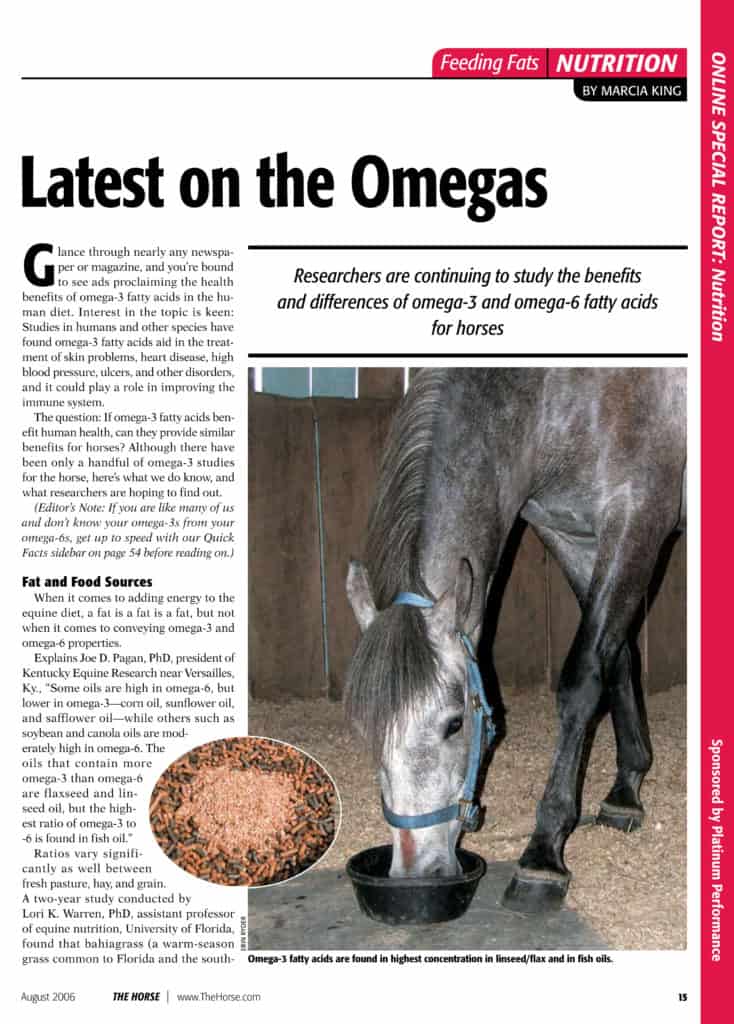Readers Respond: Herbs For Horses
More than 1,600 readers of TheHorse.com responded to a poll asking, “Would you consider using herbal supplements, such as aloe vera juice, milk thistle, ginger, etc., in your horse’s feed or as a topical
More than 1,600 readers of TheHorse.com responded to a poll asking, “Would you consider using herbal supplements, such as aloe vera juice, milk thistle, ginger, etc., in your horse’s feed or as a topical
With scores of oral joint health supplements on the market, how do horse owners know which to buy? This article examines the current state of the equine nutritional supplement industry, and it presents a seven-step “ACCLAIM” approach for horse owners.
Here’s what we know about the efficacy of this popular hoof supplement.
Mineral oil, a traditional equine laxative, clears sand from the equine intestine more effectively when used in conjunction with psyllium, according to new research from the University of Veterinary Medicine Vienna, in Austria. These results are
Scientific studies performed over the past decade have demonstrated the widespread availability of poor quality and potentially unsafe dietary supplements for both human and animal consumption. These include supplements that:
Authored and narrated by Kathryn Watts, BS, a Power Point lecture on CD entitled “Soil Minerals: The Basis of Nutrition” is now available for horse owners interested in equine health and hoof care. The science behind mineral nutrition in grass and ha
According to a recent scientific review, there is only limited evidence supporting the administration of herbal supplements in horses, despite their widespread use in the industry. Further, adverse events associated with herbal supplementation
A feed supplement is anything fed to a horse in addition to a natural diet of forage. Technically grain is a supplement. But the term has come to mean any additional nutrients (such as certain vitamins and minerals, extra protein, energy, etc.) tha
While much of the Midwest has recovered from the drought that parched the area last year, horses are continuing to experience effects from the hot, dry summer of 2006. Due to a bad hay crop, University of Missouri-Columbia veterinarians are
A group of veterinarians gathered at the Land O’ Lakes Purina Mills headquarters in St. Louis, Mo., last fall to participate in discussions on subjects that ranged from Cushing’s disease to proper nutrition for horses young and old. Nicholas Frank,
Researchers at Michigan State University (MSU) have reported in a pilot study that a bee pollen-based product shows promise in improving athletic horses’ feed intake.
Although more research is needed, Tahitian Noni Equine Essentials, an herbal product made from the Morinda citrifolia tree, could have uses as an anti-inflammatory agent, according to a cooperative study by the University of Wisconsin School of Vete

The question: If omega-3 fatty acids benefit human health, can they provide similar benefits for horses? Although there have been only a handful of omega-3 studies for the horse, here’s what we do know, and what researchers are hoping to find out.

While not every horse requires supplements, they can be beneficial in specific circumstances.
Dietary management can work like magic for specific equine diseases.
Stay on top of the most recent Horse Health news with
"*" indicates required fields